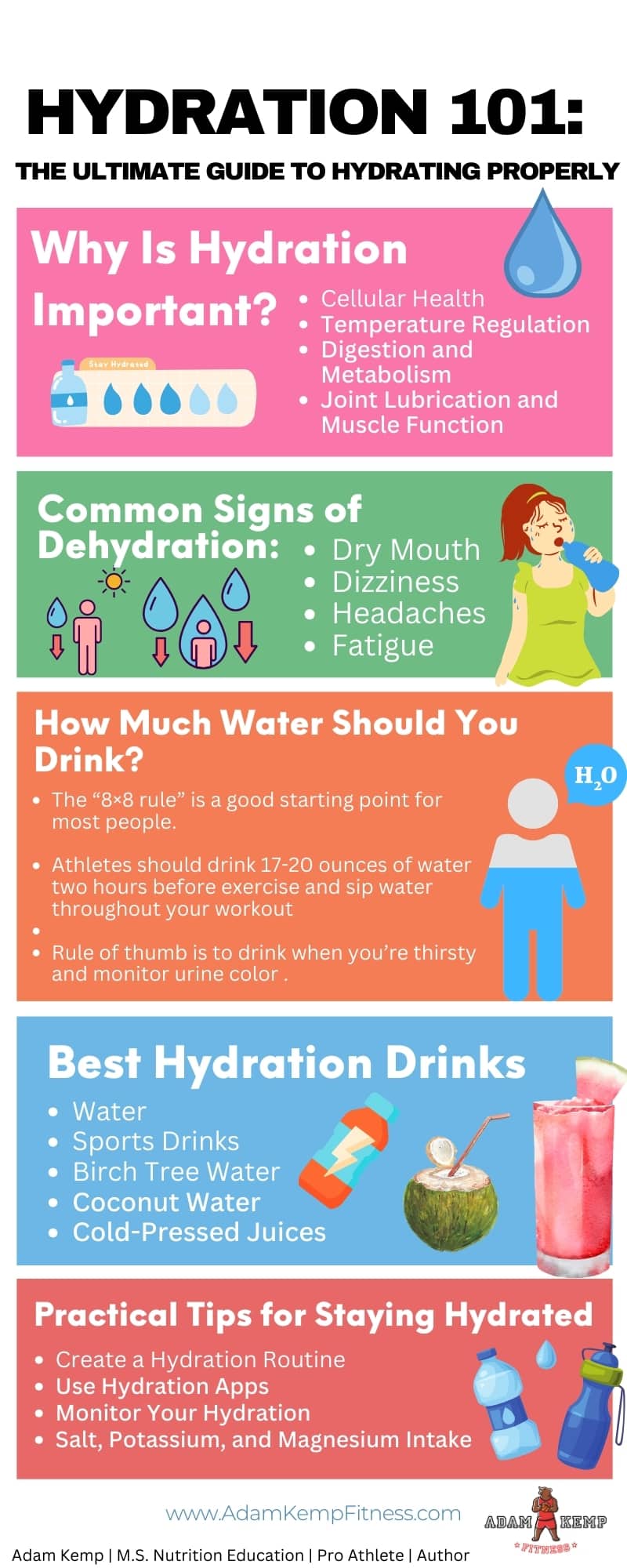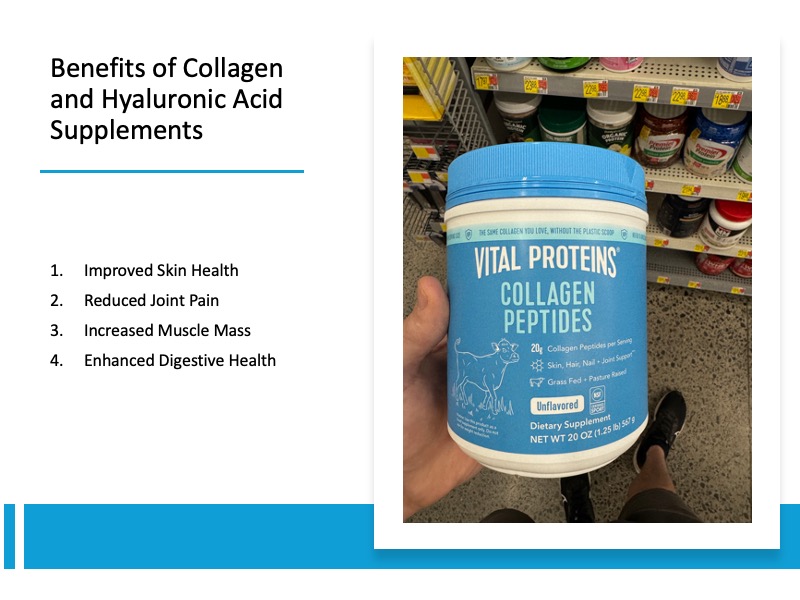Collagen: What is Collagen & What Does it Do for Your Body?
Collagen is your body’s glue.
It holds you together, making up 30% of your protein.
It’s the secret behind strong skin, resilient tendons, and smooth-jointed movement. From your muscles to your bones, even your blood vessels and gut lining rely on collagen.
Built from amino acids like proline and glycine, collagen forms a triple-helix structure—tough yet flexible.
But it doesn’t work alone.
Nutrients like vitamin C and zinc power its production, keeping your body’s framework durable and elastic.
Without collagen, life would unravel—literally.
Types of Collagen
There are 28 identified types of collagen, varying by molecular assembly, cellular components, and functional location in the body. The five main types include:
- Type I: Comprising 90% of the body’s collagen, it provides structure to skin, bones, tendons, and ligaments.
- Type II: Found in elastic cartilage, supporting joints.
- Type III: Found in muscles, arteries, and organs.
- Type IV: Present in skin layers.
- Type V: Located in the cornea, some skin layers, hair, and placental tissues.
Benefits of Collagen – What Does Collagen Do?
As the body’s most abundant protein, collagen acts as a structural framework that holds cells and tissues together.
However, beyond simply providing “structure,” collagen facilitates a wide range of biological functions critical for health and longevity.
Stimulates Fibroblast Activity and Skin Regeneration
Collagen supports the formation and function of fibroblasts in the dermis—cells that produce new collagen and extracellular matrix components.
This promotes healthy cell turnover and encourages the skin to regenerate efficiently after damage.
Replaces and Renews Skin Cells
As part of natural tissue remodeling, collagen helps replace dead or damaged skin cells.
This process is vital for maintaining a youthful, vibrant complexion and repairing micro-injuries from environmental stressors like UV radiation or pollution.
Provides a Protective Barrier for Organs
Collagen forms part of the connective tissue that surrounds and shields vital organs. It acts as a cushion and structural shield, helping prevent injury and maintaining organ alignment within body cavities.
Maintains Skin Strength, Elasticity, and Hydration
By forming the primary building block of the dermis, collagen supports skin thickness, elasticity, and water retention.
As collagen production decreases with age, skin becomes thinner, drier, and less resilient, leading to wrinkles and sagging.
Even in extreme conditions, supplementing with collagen (collagen tripeptides) has shown promise in accelerating skin recovery, improving hydration, and reducing redness following laser tattoo removal and other laser-based treatments.
Aids in Blood Clotting and Wound Healing
Collagen plays a direct role in hemostasis.
When tissue is damaged, collagen exposed at the injury site activates platelets and supports the coagulation cascade to form clots and initiate wound healing.
Supports Bone Strength and Flexibility
Collagen constitutes up to 90% of the organic matrix of bones, providing tensile strength and flexibility.
Without adequate collagen, bones become brittle and more susceptible to fractures, even if calcium levels are sufficient.
Enhances Tendon, Ligament, and Muscle Integrity
Tendons and ligaments are composed largely of Type I collagen, giving them strength to resist stretching and tearing.
In muscles, collagen supports structure and function, particularly in the extracellular matrix that transmits force during contraction.
Promotes Gut Lining Integrity
Collagen is a key component of the intestinal lining.
It helps maintain tight junctions between epithelial cells, supporting gut barrier function and potentially reducing issues like leaky gut and inflammation.
Improves Joint Function and Reduces Pain
In cartilage, collagen provides cushioning and lubrication between bones. Supplementation with collagen peptides has been shown to reduce joint pain and improve mobility, especially in athletes and older adults (Clark et al., 2008).
What Happens to Collagen During Aging?
Collagen production decreases with age, leading to faster breakdown and lower quality.
Women, particularly post-menopause, experience significant reductions.
By age 60, collagen levels decline for most individuals.
Signs of Collagen Decline
Decreased collagen levels can lead to:
- Wrinkled, sagging skin.
- Hollowness around the eyes and face.
- Muscle weakness and aches.
- Stiffer tendons and ligaments.
- Joint pain or osteoarthritis.
- Digestive issues from thinning intestinal lining.
- Reduced blood flow.
Lifestyle Factors That Damage Collagen
Collagen damage is caused by lifestyle habits and conditions, including:
- Smoking: Reduces production, damages existing collagen and elastin, and slows wound healing.
- Excessive sugar and refined carbohydrate intake: Produces advanced glycation end products, weakening collagen.
- UV light exposure: Breaks down collagen, leading to wrinkles.
- Autoimmune diseases: Conditions like rheumatoid arthritis and lupus attack collagen.
- Genetic mutations: Conditions like Ehlers-Danlos syndrome disrupt collagen production.
How to Improve Collagen Naturally
Supporting collagen production and reducing the effects of aging can be achieved through consistent lifestyle habits and dietary choices.
By combining these practices, you can enhance your body’s ability to produce collagen and maintain healthy, youthful skin and tissues over time.
Protect Your Skin From UV Damage
Ultraviolet (UV) rays break down collagen and accelerate skin aging, causing wrinkles and loss of elasticity.
Wearing sunscreen with SPF 30 or higher every day is one of the best ways to protect your skin.
Apply sunscreen generously to all exposed areas and reapply every two hours, especially after sweating or swimming.
Complement this with protective clothing like wide-brimmed hats, UV-blocking sunglasses, and lightweight, long-sleeved garments when spending extended time outdoors.
Consume Collagen-Rich Foods
Nutrition plays a key role in collagen production.
Following a balanced diet, such as the Mediterranean diet, provides your body with the nutrients it needs to produce collagen naturally.
This diet emphasizes vegetables, fruits, whole grains, nuts, and seeds, which are rich in vitamins and minerals essential for collagen synthesis.
It also includes moderate amounts of seafood, lean proteins, and dairy, which supply the amino acids needed to build collagen.
Although collagen from food cannot be absorbed in its whole form, the body breaks it into amino acids, which are used for various needs. Foods supporting collagen production include:
- Vitamin C sources: Oranges, strawberries, broccoli, potatoes.
- Proline sources: Mushrooms, cabbage, fish, meat.
- Glycine sources: Red meat, chicken, pork skin.
- Copper sources: Liver, nuts, dark chocolate.
- Zinc sources: Oysters, beans, green leafy vegetables.
Incorporate Collagen-supporting Nutrients
Focus on foods rich in vitamin C, zinc, copper, and glycine, as these are vital for collagen formation.
Include citrus fruits, bell peppers, strawberries, and broccoli for vitamin C; oysters, nuts, and seeds for zinc; and leafy greens and dark chocolate for copper.
Glycine-rich foods, such as chicken, turkey, and pork skin, also contribute to collagen production.
Stay Hydrated

Proper hydration helps maintain skin elasticity and supports the overall health of connective tissues.
Drinking enough water daily ensures that your body can effectively utilize the nutrients required for collagen production.
Avoid Harmful Habits
Smoking and excessive consumption of sugar or refined carbohydrates can damage collagen.
Smoking reduces blood flow to the skin and depletes nutrients required for collagen synthesis, while sugar creates advanced glycation end products that weaken collagen fibers.
Minimizing these habits can help protect your body’s natural collagen reserves.
Consume Collagen Supplements

Collagen supplements are not FDA-regulated and lack extensive randomized controlled trials.
Studies are often industry-funded, raising questions about reliability.
Furthermore, the body distributes collagen peptides as needed, not necessarily to the areas desired.
However, collagen supplements, often sold as peptides or hydrolyzed collagen, are absorbed through the gastrointestinal tract.
They can improve skin elasticity, hydration, and joint health while aiding muscle recovery after exercise.
Additionally, research highlights their effectiveness in reducing wrinkles, alleviating joint pain, and supporting cartilage integrity.
However, choosing a high-quality supplement is essential, as not all products are created equal.
Trusted brands like Purely Inspired, NOW Foods, and Vital Proteins offer options tailored to specific needs, from budget-friendly choices to those that combine collagen with hyaluronic acid for enhanced benefits.
In my opinion, Purely Inspired Collagen Peptides is the best budget-friendly option, offering high-quality, grass-fed bovine collagen at an affordable price, perfect for those new to collagen supplements or on a tighter budget.
Last update on 2025-04-16 / This article includes affiliate links/Images via Amazon Product Advertising API. I may earn commissions on purchases made through these links.
For premium quality, Vital Proteins Collagen Peptides stands out with its hydrolyzed bovine collagen, enhanced with hyaluronic acid and vitamin C, making it an exceptional choice for supporting skin, joints, and overall health.
Last update on 2025-04-15 / This article includes affiliate links/Images via Amazon Product Advertising API. I may earn commissions on purchases made through these links.





